Related Research Articles

Federico Fellini was an Italian film director and screenwriter. He is known for his distinctive style, which blends fantasy and baroque images with earthiness. He is recognized as one of the greatest and most influential filmmakers of all time. His films have ranked highly in critical polls such as that of Cahiers du Cinéma and Sight & Sound, which lists his 1963 film 8+1⁄2 as the 10th-greatest film.

Seven Beauties is a 1975 historical black comedy drama Italian film written and directed by Lina Wertmüller and starring Giancarlo Giannini, Fernando Rey, and Shirley Stoler.

Amarcord is a 1973 comedy-drama film directed by Federico Fellini, a semi-autobiographical tale about Titta, an adolescent boy growing up among an eccentric cast of characters in the village of Borgo San Giuliano in 1930s Fascist Italy. The film's title is a univerbation of the Romagnol phrase a m'arcôrd. The title then became a neologism of the Italian language, with the meaning of "nostalgic revocation". The central role of Titta is based on Fellini's childhood friend from Rimini, Luigi Titta Benzi. Benzi became a lawyer and remained in close contact with Fellini throughout his life.

Lucio Dalla was an Italian singer-songwriter, musician and actor. He also played clarinet and keyboards.

Francesco "Ciccio" Ingrassia was an Italian actor, comedian and film director.
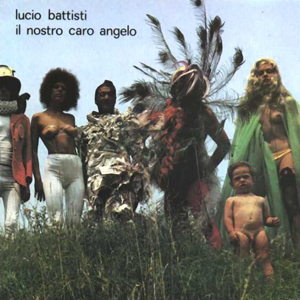
Il nostro caro angelo is an album by the Italian singer and songwriter Lucio Battisti. It was released in September 1973 by Numero Uno and was Italy's second-best selling album in 1973, the first being Battisti's previous album, Il mio canto libero.

Adriana Benetti was an Italian actress.
"Le Téléphone Pleure" was a 1974 hit single by French artist Claude François. It was released on Disques Flèche/Phonogram. The song was re-recorded in English as "Tears on the Telephone" and was a hit in the British charts in 1976.
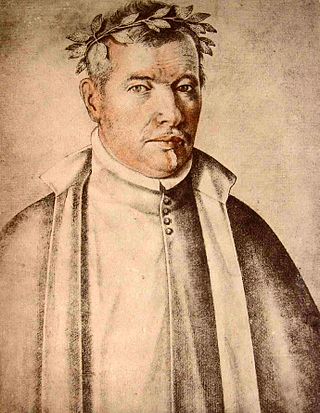
Rodrigo Caro was a Spanish priest, historian, archeologist, lawyer, poet and writer.

Nude per l'assassino is a 1975 giallo film directed by Andrea Bianchi. Written by Massimo Felisatti, the film stars Nino Castelnuovo, Edwige Fenech and Solvi Stubing, and features music by Berto Pisano. Nude per l'assassino has received mixed to negative reviews from critics.

Piange... il telefono is a 1975 Italian romance-drama film directed by Lucio De Caro. Its plot is based on the lyrics of the eponymous hit song of Domenico Modugno.

Ettore Fieramosca is a 1938 Italian historical film directed by Alessandro Blasetti and starring Gino Cervi, Mario Ferrari and Elisa Cegani. It is adapted from the 1833 novel of the same title by Massimo D'Azeglio, based on the life of the 16th century condottiero Ettore Fieramosca.
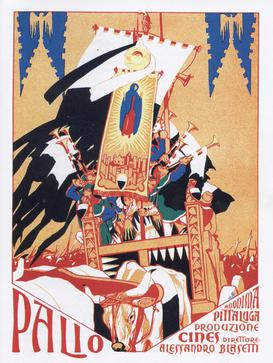
Palio is a 1932 Italian historical drama film directed by Alessandro Blasetti and starring Leda Gloria, Laura Nucci and Guido Celano. The film is set against the backdrop of the Palio di Siena during the Medieval era.
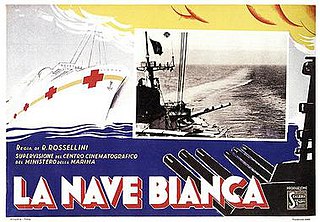
The White Ship is a 1941 Italian war film directed by Roberto Rossellini. Its cast was made up entirely of amateur actors, many of them the real crew of a hospital ship of the Italian navy. The production was a work of propaganda intended to support the war aims of the Fascist Italian regime during the Second World War. It was made with the close co-operation of the Italian Navy, particularly Francesco De Robertis. Vittorio Mussolini, the son of the Italian dictator, was also a supporter of the project.

A Pilot Returns is a 1942 Italian war film directed by Roberto Rossellini and starring Massimo Girotti, Michela Belmonte and Piero Lulli. The film forms part of Rossellini's "Fascist trilogy" along with The White Ship (1941) and The Man with a Cross (1943). It was made with the co-operation of the Italian Air Force. The film's sets were designed by the architect Virgilio Marchi.
Francesco De Robertis was an Italian screenwriter, film editor and director. His semi-documentary film-making style of the early 1940s has been credited as an influence on the development of Italian neorealism.
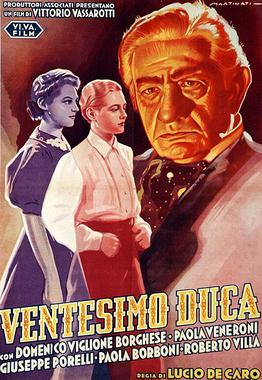
The Twentieth Duke is a 1945 Italian comedy film directed by Lucio De Caro and starring Paola Veneroni, Roberto Villa and Paola Borboni. It was shot at the Cinecitta Studios in Rome. It was made in 1943, but its release was delayed for two years. It did not go on a full national release until early 1946. The film is based on a 1925 play by Ugo Falena which had previous been made into films on two occasions The Last Lord (1926) and The Woman Dressed As a Man (1932).

Tales of an Immoral Couple is a 2016 Mexican romantic comedy written and directed by Manolo Caro. The film stars Cecilia Suárez, Ximena Romo, Manuel García Rulfo, and Sebastián Aguirre.
De Caro may refer to:
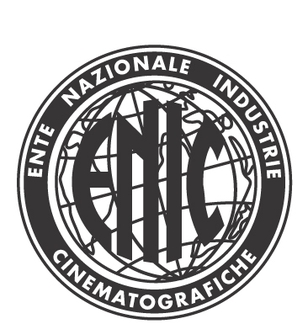
Ente Nazionale Industrie Cinematografiche (ENIC) was an Italian film production and distribution entity that operated between 1935 and 1956.
References
- ↑ Bondanella p.186